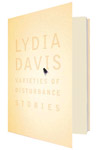Early in Lydia Davis’s new story collection, we encounter a husband and wife who have subjected themselves to a “good-taste contest,” judged by a jury of their peers. In this single-page piece, we are shown how the contestants measure up in a variety of categories—lighting fixtures, window treatments, food—then told, simply, that the husband wins. The story’s surface is stunning and taut, but it also provokes the reader to consider what’s happening just beyond the contours of Davis’s well-sculpted prose. Why does the husband have better taste in garden furniture? Was the wife angry about the verdict? And who is telling this story?
This kind of writing—elliptical, clear-eyed, harboring concealed emotions—has been flooring readers since Davis’s first major collection, Break It Down (1986). She has a knack for capturing the peculiar rhythms of minds behaving badly. One character in Varieties of Disturbance turns the decision of what to cook a date for dinner—beef? beets? definitely not snails!—into an all-consuming fixation. Her narrators tend to split their perspectives relentlessly, turning even the most ordinary domestic experiences—walking the dog, family spats—into dense nuggets of irresolvable contradictions.
It’s inspiring to watch Davis map out knotty ruminations without devolving into tongue-tied panic. Her stories are also deeply funny, though not in a willful way. Eschewing one-liners, Davis creates humor by making distressing topics collide with matter-of-fact, vaguely fascinated tones. It’s as if her characters were rubbernecking while cruising past the pileups of their own obsessions.
While the short pieces in Varieties will seem familiar to Davis’s fans, the longer ones reveal she is still pushing her material into even more complicated territory. The standout “We Miss You” masquerades as a sociological analysis of get-well notes sent by 1950s fourth-graders to a convalescing classmate. As the study’s author carefully analyzes sentence structure, gender differences, and imagery, the narrative subtly shape-shifts into the OCD musings of a methodical wack-job. The more authoritative the author gets, the more the study seems to undermine itself. She notes that one student’s handwriting frequently drops beneath the lines, speculating: “This may indicate a desire for more stability on his part, a fear of imagination, or, on the contrary, an unusually firmly grounded personality.”
Varieties also finds Davis cranking up her trademark philosophical jolts. Quite possibly buzzed on Proust, Davis (who recently translated Swann’s Way) delivers some intricate meditations on the elasticity...
You have reached your article limit
Sign up for a digital subscription and continue reading all new issues, plus our entire archives, for just $1.50/month.
Already a subscriber? Sign in





